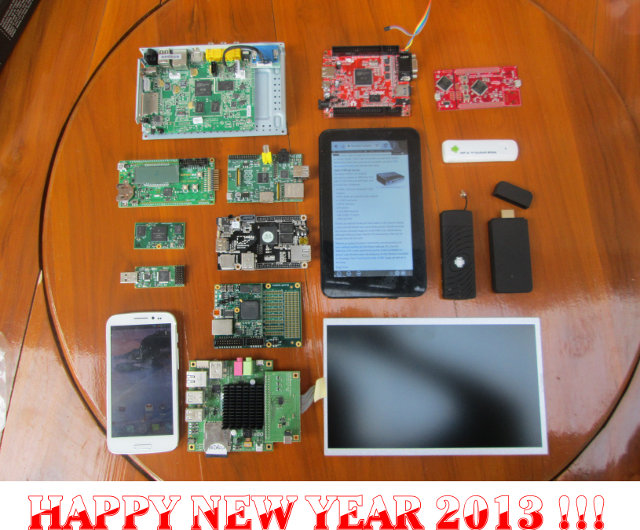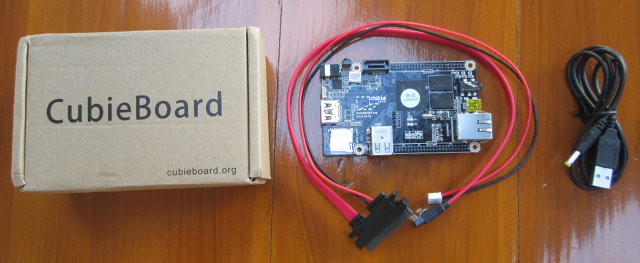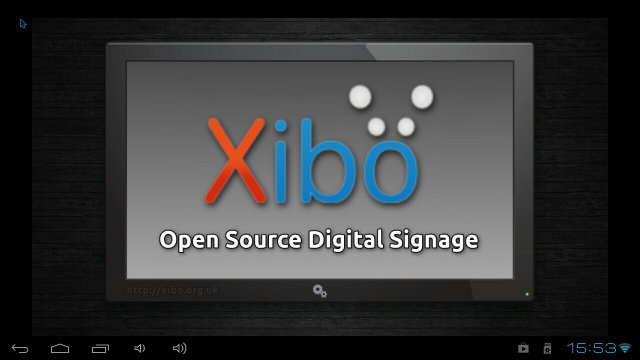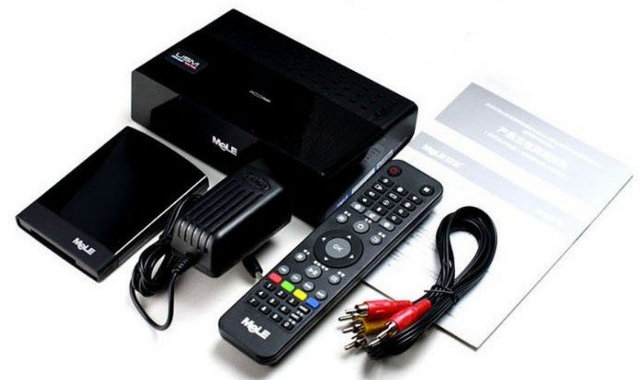This is the last day of the year, so it’s probably a good time to look back and see what interested people on this blog. This has been a banner year for low cost ARM devices and boards starting with the Raspberry Pi, then MK802 and the new mini PCs / HDMI TV dongles / PCs-on-a-stick (whatever you want to call them) that came after, always cheaper and faster. Those low cost devices have in turn made people really interested in ARM Linux, and lots of development on those little devices and boards started. The top 10 posts of 2012, according to page views, reflect just those trends: 74 USD AllWinner A10 Android 4.0 Mini PC (May 2012) – MK802 started the whole “low cost mini PCs” craze, and drove the most traffic to this blog this year. People got excited about the price, form factor, and the possibility to […]
Cubieboard Unboxing and Quick Start Guide
I’ve received another cool board this week with the Cubieboard development board. As a quick reminder, the Cubieboard is the only proper low cost AllWinner A10 development board available, and comes with 512MB/1GB RAM, 4GB NAND Flash, 10/100 MBit Ethernet, HDMI output, 2x USB Host port, 1x USB OTG port, a microSD socket, a SATA interface, an IR sensor and 2 headers to access extra pins such as GPIOs, I2C, SPI,VGA pins, CVBS pins etc… CubieTech had a successful Indiegogo campaign where the 1GB board was available for $59 including worldwide shipping (and as low as $19 for early birds), and you can now buy it from resellers. [Update: It’s now available with several cables, USB to TTL debug board, and an enclosure for $80 on dx.com] Cubieboard Unboxing The board comes with a SATA cable and a USB cable for power. There’s no power supply so you’ll need you […]
Xibo for Android on Mele A1000 Set-top Box & WM8850-MID Tablet
Earlier this month, Xibo developers announced the beta version Xibo for Android was available for testing. Contrary to the Linux & Windows clients and servers which are open source, Xibo for Android is developed by Spring Signage and will available commercially. This sponsorship will help finance the development of Xibo open source software: the 2 clients (.net in Windows, Python in Linux), the server and API. The current beta version supports the most important features of the Windows client, but lacks support for Adobe Flash, Microsoft PowerPoint, Datasets, Microblog, Stats, Counter Media, Socket Listener, Lift/Serial Interface Support, Offline Update via USB Drive, Full Compositing (overlapping regions) and Video Transparency. If you want to test the Xibo client for android, you can register for the private BETA and download an APK (Xibo_Android_Clientv1.0.12.apk) to install on your Android devices. Being part of the BETA program will also guarantee you a price of […]
XBMC for Linux on AllWinner A10 Devices? It Works! (Sort of)
Following the lack of support by AllWinner for the video engine libraries (CedarX), I had more or less given up on hope XBMC for Linux would ever run properly on AllWinner A10/A13 hardware. But recently, I found out some progress had been made using existing libs, and saw the Pengpod Tablet video showing XBMC running in Linux fairly smoothly. So I decided to cross-compile XBMC by following the instructions available at http://linux-sunxi.org/XBMC and trying to run it in Linaro ALIP 12.04 rootfs in my Mele A1000. Finally, I managed to cross-compile XBMC, but the performance was very poor in the GUI (6 to 12 fps) and I was unable to play videos and my serial console was flooded with messages like:
|
1 |
[DISP] not supported image0 pixel sequence:216 in img_sw_para_to_reg |
[Update: I managed to have XBMC Linux running & playing videos on Mele A1000 by using j1nx image (rootfs + kernel). I would first exhibit the exact same […]
$100 Mele A1000G / A2000G Android Media Players with 1GB RAM and 8GB Flash
I’ve been asked by several people when there would be a Mele with 1GB RAM, well the time is now, with the Mele A1000G and Mele A2000G. Both appear to be based on the previous Mele A1000 and Mele A2000 set-top boxes, but feature 1 GB RAM and 8 GB Flash instead of 512 MB RAM and 4 GB Flash. Here are Mele A1000G & Mele A2000G Specifications: SoC – AllWinner A10 Cortex A8 processor @ 1GHz System Memory – 1 GB DDR3 Storage: 8GB NAND Flash SD card slot (up to 32 GB) Connectivity: Wi-Fi – 802.11 b/g 10/100 MB Ethernet USB – 3 USB Host ports SATA Interface for 2.5″ HDD Video Output – HDMI, composite and VGA. Audio Output – RCA stereo output and optical out (SPDIF) Audio Formats – MP3 / WMA / WAV / OGG / FLAC / MKA Video Formats – TS / M2TS […]
Building Kernel Modules for AllWinner A10 Android Devices (e.g. Joystick Support)
Reader JP has enabled Joystick support in Android 4.0.4 on its Mele A1000, this now works with a Playstation2 joystick via USB adapter, a Huskee PC joystick, and 2 other unbranded joysticks. In order to enable Joystick support he had to build a kernel module, and encountered a few issues, so he wrote an how-to which shows what challenges he went through and what solutions he found to those issues.I’m sharing today a slightly edited version of this how-to. This How-to assumes that you have a valid Linux environment where you can build allwinner A10 kernel. The toolchain used was “Sourcery CodeBench for ARM GNU/Linux Lite“ which can be downloaded here: http://www.codesourcery.com/sgpp/lite/arm/portal/package7853/public/arm-none-linux-gnueabi/arm-2010.09-50-arm-none-linux-gnueabi.bin To install it, simply run:
|
1 |
sudo ./arm-2010.09-50-arm-none-linux-gnueabi.bin |
You’ll also need the latest Allwinner A10 kernel source:
|
1 |
git clone git://github.com/amery/linux-allwinner.git |
Then follow the usual procedure:
|
1 2 |
make ARCH=arm sun4i_crane_defconfig make menuconfig ARCH=arm |
I then selected the modules needed for different kind of joysticks namely:
|
1 2 3 4 5 6 7 8 9 10 11 12 13 14 15 16 17 |
--- Networking support <*> Bluetooth subsystem support ---> <M> HIDP protocol support Bluetooth device drivers ---> <M> HCI USB driver [*] HID Devices ---> Special HID drivers ---> <M> Sony PS3 controller <M> DragonRise Inc. game controller [*] DragonRise Inc. force feedback <M> Pantherlord/GreenAsia game controller [*] Pantherlord force feedback support <M> GreenAsia (Product ID 0x12) game controller support [*] GreenAsia (Product ID 0x12) force feedback support <M> SmartJoy PLUS PS2/USB adapter support [*] SmartJoy PLUS PS2/USB adapter force feedback support |
I saved the […]
New Android 4.0.4 Firmwares for Mele A1000 / A2000
Mele released a new firmware for the Mele A1000, A100 and A2000 Android media players. Here are the download page for Android 4.0 V1.1 (Thanks Fabricio & JP) and the changelog: Update to Android 4.0.4 Fixed problem with Flash Player “black screen” Mouse speed can be set Option to turn on/off the background applications Allowed to set the font size Supports playback of DVD and Blu-Ray ISO files (Files mode) Multiple mouse devices can be used Full-screen playback of online video sources I haven’t had time to try it myself yet, but some people did, and it fixed some of their issues (e.g. HD multicast video streaming). Tip: Since the whole download process in in Chinese, “下载” means “download” in Chinese. You’ll have to be patient because the download is slow right now (About 5KB/s on my side). Kimdecent also informed me they’ve released a new firmware for the Mele A1000/A2000 […]
AllWinner A10 Initramfs Support and Linaro 12.07 Image
An initramfs is a minimal root filesystem that is loaded at an early stage of the boot process, before the rootfs partition is mounted. This is optional but is now used by many Linux distributions such as Ubuntu in order to speed up boot time among others things. Up to recently, there was no support for this in the AllWinner A10 nightly builds, and there would be lot of error messages due to ureadahead process with Ubuntu, but I’ve changed that by: Using a boot.scr file (U-Boot Script) for each supported device in order to either follow the default init boot method or do an initramfs boot if uInitrd file is present in the FAT partition. Adding a script (a1x-initramfs.sh) to generate and install uInitrd initramfs in the rootfs. The initramfs can’t be generated at build time since the hardware packs are (mostly) distribution agnostic. If you want an initramfs, […]







